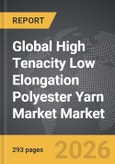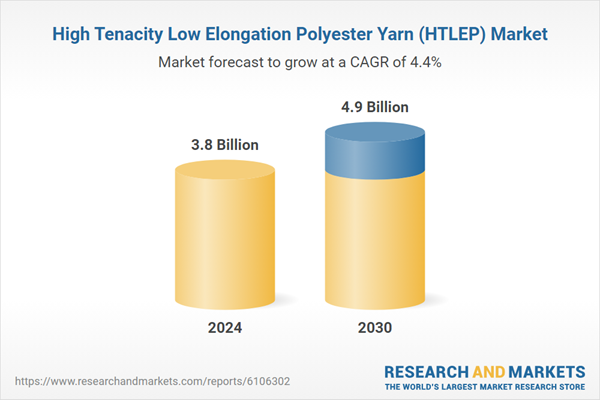Global High Tenacity Low Elongation Polyester Yarn (HTLEP) Market - Key Trends & Drivers Summarized
Is HTLEP Yarn the Future Backbone of High-Performance Industrial Textiles?
High Tenacity Low Elongation Polyester Yarn (HTLEP) is increasingly being positioned as a foundational material in the landscape of high-performance industrial textiles, owing to its unique mechanical and physical properties. Unlike conventional polyester yarns, HTLEP offers superior tensile strength and significantly reduced stretch, which makes it highly suitable for applications that demand structural integrity, load-bearing capacity, and dimensional stability. This type of yarn is engineered through specialized spinning and drawing processes that align the polymer chains for maximum molecular orientation and crystallinity, yielding remarkable resistance to deformation under stress. As a result, HTLEP finds its way into a wide spectrum of applications, including conveyor belts, safety harnesses, industrial sewing threads, automotive seatbelts, coated fabrics, and reinforcement geotextiles. The material's durability under mechanical loads, combined with its resistance to moisture, UV radiation, and a wide range of chemicals, makes it a preferred choice in challenging environmental conditions. In sectors such as transportation, manufacturing, agriculture, and construction, the demand for yarns that can endure prolonged wear and tear without significant loss of strength or elongation is surging, driving further adoption of HTLEP. In many ways, this yarn is becoming the unsung hero of infrastructure and equipment, enabling the creation of products that are both lightweight and unyielding. Its consistent performance under rigorous operating conditions not only reduces maintenance costs but also extends the service life of end-use products, making it a cost-effective and reliable solution for modern industrial applications.How Is the Automotive and Safety Equipment Industry Shaping the Demand Curve for HTLEP?
The surge in demand for durable and safe automotive and industrial safety equipment is directly influencing the growth of the HTLEP polyester yarn market. In the automotive sector, this yarn is widely used in the production of seat belts, airbags, door liners, and tire reinforcements - components where tensile strength and dimensional accuracy are non-negotiable. Seat belts, for example, require yarn that can withstand enormous tensile forces during impact without stretching excessively, to ensure occupant safety. HTLEP meets this need by combining exceptional strength with minimal elongation, ensuring optimal performance in emergency scenarios. Additionally, as vehicles evolve with new safety regulations and advanced safety systems, the performance requirements of the underlying materials have also risen. This makes HTLEP yarn not just an option but a necessity in modern automotive design. The industrial safety segment, which includes personal protective equipment (PPE), climbing gear, load-bearing straps, and fall arrest systems, also heavily relies on HTLEP for its ability to provide structural integrity under dynamic loads. Its resistance to wear, tear, and environmental degradation makes it ideal for equipment that must function reliably under critical conditions. As occupational safety standards become more stringent worldwide, and as both developed and developing nations invest in safer work environments, the use of HTLEP yarn in safety-related applications is expanding. These trends are not only driving demand but are also pushing manufacturers to innovate around coating technologies, flame resistance, and customized fiber geometries to meet sector-specific requirements.Are Material Advancements and Process Innovations Redefining HTLEP Yarn Capabilities?
Technological innovations in polymer chemistry and fiber engineering are unlocking new potential for HTLEP yarn, improving its performance metrics and expanding its applicability across emerging industries. Manufacturers are now deploying precision-controlled drawing, heat setting, and spin-finish applications that enhance tenacity while optimizing surface characteristics for better processability. Developments in the molecular weight and branching of polyester polymers are also playing a crucial role in improving strength-to-weight ratios and minimizing creep, a vital characteristic in long-term structural applications. In addition, hybrid yarns - where HTLEP is blended with aramids, glass fibers, or carbon fibers - are gaining traction in high-performance composite materials used in aerospace, defense, and advanced manufacturing. Surface treatments and finishes that improve bonding with resins or provide flame resistance are further enhancing the utility of HTLEP in sophisticated applications. Innovations in recycling technologies have begun to address sustainability challenges by enabling the production of high-quality HTLEP from post-consumer or industrial PET waste, supporting the growing demand for eco-conscious materials without sacrificing quality. Automation and AI-driven process monitoring in production facilities have also allowed for tighter quality control, ensuring consistency in denier, shrinkage, and tensile performance across large-scale manufacturing runs. These technological enhancements are not only helping producers to meet increasingly stringent client specifications but are also opening up possibilities in sectors previously out of reach, such as medical textiles, ballistic fabrics, and technical apparel. As industry needs evolve, the adaptability and upgrade potential of HTLEP yarns make them a continuously relevant and valuable material for the future.What Market Dynamics Are Catalyzing the Growth of the Global HTLEP Yarn Industry?
The growth in the High Tenacity Low Elongation Polyester Yarn (HTLEP) market is driven by multiple interwoven factors linked to end-use industry expansion, regulatory standards, global trade flows, and environmental pressures. Rapid urbanization and infrastructure development, particularly in Asia-Pacific and the Middle East, are fueling the demand for industrial fabrics, geotextiles, and construction reinforcements - key application areas for HTLEP. Similarly, the rise in automotive production across regions such as India, China, and Eastern Europe is spurring demand for high-performance safety components that depend on this yarn. Furthermore, international regulations emphasizing automotive occupant safety, workplace accident reduction, and material durability are increasing the specification of HTLEP yarn in manufacturing protocols and procurement policies. As supply chains become more integrated and specialized, manufacturers are leveraging HTLEP's reliable performance characteristics to streamline production and improve product lifecycle efficiency. Additionally, growing environmental consciousness is prompting demand for recyclable, long-lasting materials, a space where polyester-based yarns including HTLEP are well-positioned due to their recyclability and durability. Trade liberalization and the emergence of textile manufacturing hubs with competitive labor costs are also enabling lower-cost production and broader distribution of HTLEP yarns globally. Investments in textile R&D centers, particularly in countries with strong industrial bases, are facilitating innovation and local sourcing of customized HTLEP variants tailored to regional demands. These macro- and micro-level dynamics are converging to create a robust and resilient growth environment for HTLEP yarn, affirming its role as a material of strategic importance across a multitude of modern industries.Report Scope
The report analyzes the High Tenacity Low Elongation Polyester Yarn (HTLEP) market, presented in terms of market value (US$). The analysis covers the key segments and geographic regions outlined below:- Segments: Denier (Below 2000 Denier, 3000 - 3300 Denier, 3310 - 4400 Denier, Other Deniers); End-Use (Geotextiles End-Use, Seat Belt End-Use, Cord Strappings End-Use, Billboard Sheets End-Use, Hoarding End-Use, Fire Hose End-Use, Other End-Uses).
- Geographic Regions/Countries: World; United States; Canada; Japan; China; Europe (France; Germany; Italy; United Kingdom; Spain; Russia; and Rest of Europe); Asia-Pacific (Australia; India; South Korea; and Rest of Asia-Pacific); Latin America (Argentina; Brazil; Mexico; and Rest of Latin America); Middle East (Iran; Israel; Saudi Arabia; United Arab Emirates; and Rest of Middle East); and Africa.
Key Insights:
- Market Growth: Understand the significant growth trajectory of the Below 2000 Denier HTLEP segment, which is expected to reach US$1.9 Billion by 2030 with a CAGR of a 3.4%. The 3000 - 3300 Denier HTLEP segment is also set to grow at 5.9% CAGR over the analysis period.
- Regional Analysis: Gain insights into the U.S. market, valued at $1 Billion in 2024, and China, forecasted to grow at an impressive 7.9% CAGR to reach $994.4 Million by 2030. Discover growth trends in other key regions, including Japan, Canada, Germany, and the Asia-Pacific.
Why You Should Buy This Report:
- Detailed Market Analysis: Access a thorough analysis of the Global High Tenacity Low Elongation Polyester Yarn (HTLEP) Market, covering all major geographic regions and market segments.
- Competitive Insights: Get an overview of the competitive landscape, including the market presence of major players across different geographies.
- Future Trends and Drivers: Understand the key trends and drivers shaping the future of the Global High Tenacity Low Elongation Polyester Yarn (HTLEP) Market.
- Actionable Insights: Benefit from actionable insights that can help you identify new revenue opportunities and make strategic business decisions.
Key Questions Answered:
- How is the Global High Tenacity Low Elongation Polyester Yarn (HTLEP) Market expected to evolve by 2030?
- What are the main drivers and restraints affecting the market?
- Which market segments will grow the most over the forecast period?
- How will market shares for different regions and segments change by 2030?
- Who are the leading players in the market, and what are their prospects?
Report Features:
- Comprehensive Market Data: Independent analysis of annual sales and market forecasts in US$ Million from 2024 to 2030.
- In-Depth Regional Analysis: Detailed insights into key markets, including the U.S., China, Japan, Canada, Europe, Asia-Pacific, Latin America, Middle East, and Africa.
- Company Profiles: Coverage of players such as Abbott Laboratories (Abbott Nutrition), Amway Corporation, Archer Daniels Midland Company (ADM), Arla Foods Ingredients Group P/S, Beyond Meat, Inc. and more.
- Complimentary Updates: Receive free report updates for one year to keep you informed of the latest market developments.
Some of the 41 companies featured in this High Tenacity Low Elongation Polyester Yarn (HTLEP) market report include:
- AYM Syntex
- Beaulieu Technical Textiles
- Cordenka GmbH & Co. KG
- Dongguan DongDing Chemical
- DuPont de Nemours, Inc.
- E.I.D. Parry (India) Limited
- Formosa Taffeta Co., Ltd.
- Huvis Corporation
- Indorama Ventures
- Jiangsu Hengli Group
- Jiangsu Sanfangxiang Group
- Kayavlon Impex Pvt. Ltd.
- Kolon Industries, Inc.
- Kuraray Co., Ltd.
- Mitsubishi Chemical Group
- Reliance Industries Limited
- SASA Polyester Sanayi A.S.
- SRF Limited
- Teijin Frontier Co., Ltd.
- Toray Industries, Inc.
This edition integrates the latest global trade and economic shifts into comprehensive market analysis. Key updates include:
- Tariff and Trade Impact: Insights into global tariff negotiations across 180+ countries, with analysis of supply chain turbulence, sourcing disruptions, and geographic realignment. Special focus on 2025 as a pivotal year for trade tensions, including updated perspectives on the Trump-era tariffs.
- Adjusted Forecasts and Analytics: Revised global and regional market forecasts through 2030, incorporating tariff effects, economic uncertainty, and structural changes in globalization. Includes historical analysis from 2015 to 2023.
- Strategic Market Dynamics: Evaluation of revised market prospects, regional outlooks, and key economic indicators such as population and urbanization trends.
- Innovation & Technology Trends: Latest developments in product and process innovation, emerging technologies, and key industry drivers shaping the competitive landscape.
- Competitive Intelligence: Updated global market share estimates for 2025, competitive positioning of major players (Strong/Active/Niche/Trivial), and refined focus on leading global brands and core players.
- Expert Insight & Commentary: Strategic analysis from economists, trade experts, and domain specialists to contextualize market shifts and identify emerging opportunities.
Table of Contents
Companies Mentioned (Partial List)
A selection of companies mentioned in this report includes, but is not limited to:
- AYM Syntex
- Beaulieu Technical Textiles
- Cordenka GmbH & Co. KG
- Dongguan DongDing Chemical
- DuPont de Nemours, Inc.
- E.I.D. Parry (India) Limited
- Formosa Taffeta Co., Ltd.
- Huvis Corporation
- Indorama Ventures
- Jiangsu Hengli Group
- Jiangsu Sanfangxiang Group
- Kayavlon Impex Pvt. Ltd.
- Kolon Industries, Inc.
- Kuraray Co., Ltd.
- Mitsubishi Chemical Group
- Reliance Industries Limited
- SASA Polyester Sanayi A.S.
- SRF Limited
- Teijin Frontier Co., Ltd.
- Toray Industries, Inc.
Table Information
| Report Attribute | Details |
|---|---|
| No. of Pages | 293 |
| Published | January 2026 |
| Forecast Period | 2024 - 2030 |
| Estimated Market Value ( USD | $ 3.8 Billion |
| Forecasted Market Value ( USD | $ 4.9 Billion |
| Compound Annual Growth Rate | 4.4% |
| Regions Covered | Global |









